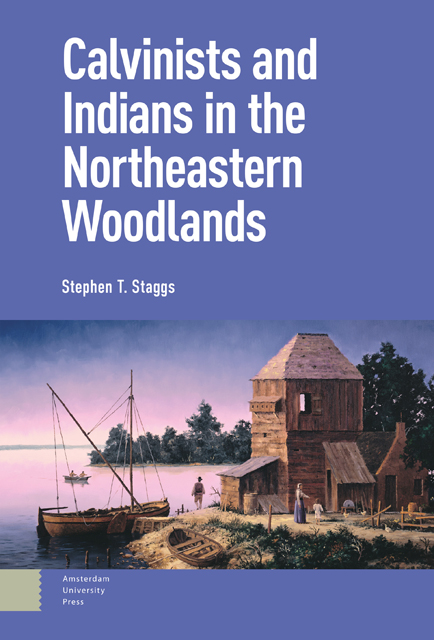Book contents
- Frontmatter
- Contents
- Acknowledgements
- Abbreviations
- List of Figures
- Notes on Usage
- Introduction
- 1 “Gentiles by Nature,” 1566–1626
- 2 “So That the Fullness of the Gentiles Might Gradually Come In,” 1627–1642
- 3 “A Church and Community among the Christians and the Blind Gentiles,” 1642–1652
- 4 “We, with God’s Help, Hope to Bring the Barbarous Tribes to Devotion,” 1652–1660
- 5 “Who Gave Jacob for a Spoil and Israel to the Robbers?” 1660–1664
- 6 “A Gentile Woman, Karanondo, … Now Called Lidia,” 1664–1750
- Conclusion
- Appendix A Dutch References to Indians: 1609–1664
- Appendix B Indian Baptisms, Professions of Faith, and Marriages in the Dutch Reformed Churches of New York: 1690–1750
- List of Archival Sources
- Bibliography
- Index
4 - “We, with God’s Help, Hope to Bring the Barbarous Tribes to Devotion,” 1652–1660
Published online by Cambridge University Press: 17 October 2023
- Frontmatter
- Contents
- Acknowledgements
- Abbreviations
- List of Figures
- Notes on Usage
- Introduction
- 1 “Gentiles by Nature,” 1566–1626
- 2 “So That the Fullness of the Gentiles Might Gradually Come In,” 1627–1642
- 3 “A Church and Community among the Christians and the Blind Gentiles,” 1642–1652
- 4 “We, with God’s Help, Hope to Bring the Barbarous Tribes to Devotion,” 1652–1660
- 5 “Who Gave Jacob for a Spoil and Israel to the Robbers?” 1660–1664
- 6 “A Gentile Woman, Karanondo, … Now Called Lidia,” 1664–1750
- Conclusion
- Appendix A Dutch References to Indians: 1609–1664
- Appendix B Indian Baptisms, Professions of Faith, and Marriages in the Dutch Reformed Churches of New York: 1690–1750
- List of Archival Sources
- Bibliography
- Index
Summary
Abstract
Chapter four explores the period (1652–1660) wherein Megapolensis, the pastor of the Dutch Reformed Church in New Amsterdam, witnessed Native Americans and New Netherlanders becoming more intimately acquainted. Megapolensis took a Native American into his home for over two years. Ironically, this familiarity bred contempt among colonial officials trying to assert their authority during a period in which many new settlements took root. As Europeans became a more permanent part of the landscape, Native peoples grew more and more reliant on their “Christian” neighbors. Meanwhile, Native leaders grew increasingly impatient with their uncivilized new neighbors. The familiar, interdependent relationships between the Natives and Europeans living in the Northeastern Woodlands were put to the test.
Keywords: Lenape Indians, Haudenosaunee, New Netherland, Dutch Calvinism, Susquehannock Indians, Native–Dutch Relations
Utrecht, 1652
A few short weeks before the tulips reached peak bloom, a wealthy magistrate from Utrecht sat down to write a letter of complaint to the Heren XIX (Lords Nineteen). In his letter, the magistrate, one Cornelis van Werckhoven, expressed his frustration with the “wilden” (savages) of Nieuw Nederland (New Netherland). The previous year Van Werckhoven purchased large tracts of land near the Nevesinck and Tappan from the Raritan Indians who he considered to be the “lawful owners.” After returning from a trip to Gelderland, he opened a letter from the chief clerk of the Geoctroyeerde West-Indische Compagnie (Chartered West India Company or WIC) dated March 11. In it the clerk included an excerpt from a letter from Baron Hendrik van der Capellen tot Rijssel, a nobleman from Gelderland and a representative in the Staten-Generaal (States General). In his letter, Van der Capellen informed the Heren XIX that he purchased the very same parcels of land from the Raritans. Beside himself, Van Werckhoven exclaimed, “I cannot believe that, even though they are savages, they will sell a piece of property twice.” At the next city council meeting in April, a still fuming Van Werckhoven informed his fellow magistrates in Utrecht of his plans to head to Nieuw Amsterdam (New Amsterdam).
One month later, as growers cut the colorful flower heads from their tulips, the eldest son of Kiliaen van Rensselaer welcomed a newly minted dominee (reverend) into his office in Amsterdam.
- Type
- Chapter
- Information
- Calvinists and Indians in the Northeastern Woodlands , pp. 131 - 168Publisher: Amsterdam University PressPrint publication year: 2023



